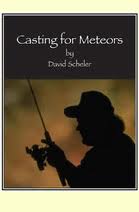Book Review
Casting for Meteors, Poems by David Scheler, Finishing Line Press, 2011. $14.95
Reviewed by Mark Zimmermann
Many of the poems in Dave Scheler's new chapbook, Casting for Meteors, seem like they might've been written hundreds of years ago. Not that the poems are archaic in sensibility or usage, far from it. Rather, Scheler’s work as a whole brings to the reader appreciations of, and meditations on, the natural world untethered to any particular period other than the seasons of the year. Here, in its entirety, is “Memento Mori”:
First snow
powders black limbs
white, dusts
the tawny meadow.
The carcass
of a yearling
glistens on the grass.
Scheler's poems tend toward brevity—I think he has probably absorbed a lot of haiku and tanka—and often depict only the briefest of moments. But again and again those moments linger, making this brevity deceptive. Such work leaves the impression that here is a poet who likes to take his time with what he sees and feels. Readers can be well rewarded by spending a lot of time with any number of Scheler’s short poems.
The tones and moods throughout this book are ones of solitude, the images those of an attentive and laid back observer.
The inhabitants of Scheler’s poems are almost exclusively animals and plants. Their lives more than anything focus and animate the work. And when those lives end as nothing more than skeletons under the snow or so many dead leaves, as they must, the tenor remains calm, stoic. Scheler’s cool approach to transience as a natural fact, though well-worn, is wise and attractive in its own right, and in reading these poems one might sometimes feel less oppressed by the world of man-made concerns. At least I do.
Things are very different, though, when people are the center of the work. In the only two poems where humans play a major part—“Scars Behind the Wall” and “Flashpoint” (see sidebar)—life gets ugly, and fast. Pride, absolutism, and brutality appear in their all-too-familiar forms. I suppose that these poems might be broadly classed as “anti-war” or “political” poems but, unlike all too many such works, Scheler’s don't hit the reader over the head with over-heated sentiment or partisan postures. I think it is to his credit that here the poet is more interested in people than in ideas—that old woman lugging the cracked jug in “Flashpoint” being a haunting (but also resilient) case in point.
Over all, Casting for Meteors delivers a variety of skillfully crafted reflections on scenes and living things that count. But why take my word for it? Spend a few hours with Scheler’s poems yourself.
Since 2004 Mark Zimmermann has lived with his wife in Milwaukee where he teaches writing and humanities courses at the Milwaukee School of Engineering. Before that they spent a year in northern Poland, nearly three years in Budapest, and eight years in Japan.


